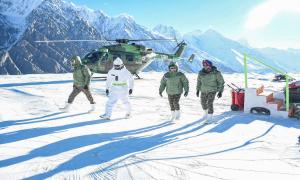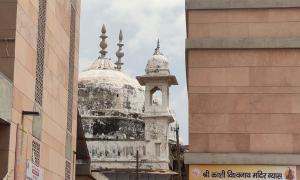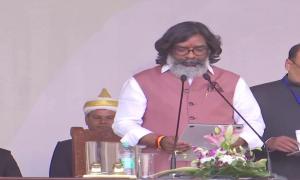One group -- called Lashkar-e-Tayiba, or Army of the Pure -- represents an example of how Osama bin Laden's followers take advantage of scattered Islamic militant allies to maintain momentum four years after a US-led military campaign destroyed al-Qaeda camps in Afghanistan.
Lashkar is among a number of organizations dedicated to wresting control from India of the three-fifths of the disputed region of Kashmir under its flag. US officials say the group stands out for a number of reasons, however, including its missionary work and other involvement outside the region.
Parts of Pakistan's intelligence services previously supported Lashkar, but Pakistani President Gen. Pervez Musharraf banned Lashkar in 2002 for its alleged links to an attack on India's parliament.
Lashkar leaders insist the group's focus is to free Muslims in the Indian-controlled sector of Kashmir, not attacks on the West. Pakistani officials say the group is local, not international.
In an interview with The Associated Press, the Pakistani ambassador to the US, Jehangir Karamat, said he considers Lashkar incapable of international terrorism, particularly working with al-Qaeda because the groups have different languages and agendas.
"They have no linkage with any organization in Pakistan," Karamat said, speaking of al-Qaeda. "They don't need it, and they don't have it. Never had it."
'Lashkar acts as a secret police for Al Qaeda'
Still, the United States is watching Lashkar closely because of its apparent willingness to help those involved in the global jihad on a grass-roots level.
The US officials, who spoke on condition of anonymity because of the subject's sensitivity, said they don't believe Lashkar's leadership is coordinating international attacks with groups including the remnants of al-Qaeda. Instead, they worry about connections among foot soldiers -- extremists who may point friends of friends to paramilitary camps.
Last year, the State Department estimated the group had several thousand members.
The Lashkar organization represents a classic example of the diffusion of Islamic extremism, based in Afghanistan until the United States threw out the Taliban regime in 2001, that CIA Director Porter Goss and other intelligence officials have warned of.
Ken Katzman, a Middle East expert at the Congressional Research Service, said groups including Lashkar have revived the training infrastructure formerly found in Afghanistan, setting up "Afghanistan East" in northern Pakistan. Some in Pakistan deny the camps' existence.
"I think this is emerging as the next theater to test whether Pakistan is serious about eliminating the al-Qaeda presence," Katzman said.
Lashkar parent unit Jamaat-ud-Dawa splits
Some examples of high-profile moments where Lashkar's fingerprints are suspected or spotted:
-
International authorities are looking into whether an Islamic school run by Lashkar trained, perhaps even spiritually, at least one of the bombers who attacked four London buses on July 7. Officials also are looking closely at the associations of the three other bombers. Pakistani authorities have yet to find direct links and say any tie may be a small piece of the investigation. London blasts: Complete coverage
- In Virginia, a prominent Islamic scholar was sentenced to life in prison this year for encouraging his followers to join the Taliban and fight the United States after 9/11. After one fiery speech, several attendees went to Pakistan and received military training from Lashkar. The young men were part of the "Virginia jihad network" that sometimes trained for holy war by playing paintball games in the woods.
- US officials say Abu Farraj al-Libbi, a top al-Qaeda operational leader picked up in Pakistan in May, ran from a site associated with Lashkar before Pakistani forces captured him in a graveyard shootout. He is in US custody, accused of planning two assassination attempts on Musharraf. Pakistani officials have said al-Libbi was sheltered by another Muslim militant organization.
- In March 2002, another senior al-Qaeda lieutenant and planner, Abu Zubaydah, was captured at a Lashkar safe house in Faisalabad, Pakistan.
-
The so-called "Australian Taliban," David Hicks, who US forces captured fighting with the Taliban in Afghanistan, was trained by Lashkar in the late 1990s. He is now being held in Guantanamo Bay, Cuba. Pakistan is source of terrorism: Australia
The Bush administration is cautious about pushing too hard on Pakistan, a close ally in the fight against terror.
The United States added Lashkar to its list of terror groups in 2001 and extended the designation in December 2003.
"We hope this list will help to isolate these terrorist organizations ... and to prevent their members' movement across international borders," State Department spokesman Richard Boucher said then.
US officials acknowledge the differences between al-Qaeda and Lashkar, including their respective roots in the Wahhabi, an Arab sect of Islam, and the Deobandi, a sect born in northern India.
Yet they say that their histories have intersected since the 1990s, creating highly complex and dangerous relationships that authorities sometimes struggle to monitor.
The officials and counter-terror experts note that camps affiliated with Lashkar may be particularly attractive to extremist recruits because they don't get the scrutiny of those run by al-Qaeda, now largely underground.
"What's crazy is that these groups, because they are a little bit more low key than al-Qaeda, they have been able to operate, in Pakistan especially, without hindrance," said Evan Kohlmann, an international terrorism consultant who has studied Lashkar.
(Associated Press writers Foster Klug in Washington and Matthew Pennington in Islamabad contributed to this report)








More from rediff